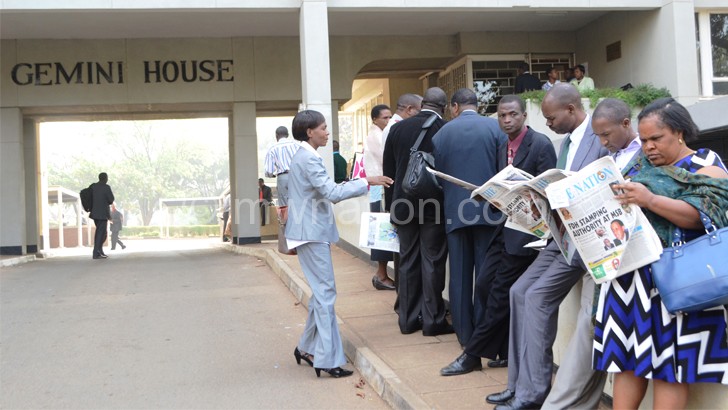Govt freezes advance pension payments
Government has suspended payments of advance pensions to retiring civil servants in Capital Hill’s latest sign of fiscal distress, Weekend Nation has learnt.
The move—which has rolled back a policy in force for 25 years—has irked the Civil Servants Trade Union (CSTU) which plans to formally protest the decision when it next meets the Government Negotiating Team (GNT) on an unnamed date.

Communication we have seen shows that the Department of Human Resource Management and Development (DHRMD) issued a ban on advance payment of terminal benefits for civil servants within 18 months to their retirement.
The communication, dated April 10 2016, stated that a wave of applications from serving civil servants was straining the fiscus resulting in late pension payments to those already on retirement who struggle financially.
The statement, signed by DRHMD Principal Secretary Blessings Chilabade, supersedes circular Ref. No. PD/04/1/0/VI/6 dated June 11 1991.
The 1991 circular restored provisions of the Malawi Public Service Regulations (MPSR) 1:810 which provided for advance payment of terminal benefits to civil servants or other employees in the public service of not more than 50 percent within 18 months prior to their dates of retirement.
Reads the circular in part: “Government, through the Secretary to the Treasury who is responsible for granting approvals to responsible officers in applications of this nature, has, of late, received an overwhelming number of applications for advance payment of terminal benefits.
“However, due to limited resources under the Pension and Gratuity Fund, Government has not been able to timely meet the cost of the 50 percent advance payments and that of the full gratuities for civil servants who already retired from the service. Government has, therefore, found it most appropriate, in the time being, that priority for the limited resources available be for immediate payment of gratuity and monthly pension of the civil servants and other employees who already retired from the service.”
Government, according to the circular, fears that sustained pressure on advance payments could put Capital Hill in a position where it will accumulate huge sums of arrears on gratuity for the officers who already retired while paying the 50 percent gratuity requests for those serving their last 18 months.
DHRMD spokesperson Rudo Mwadiwa confirmed the communication in an e-mailed response on Tuesday.
But she said her department does not have a budget of its own specifically for pensions and referred Weekend Nation to Treasury.
“All I can say is that the ban became effective the day the circular was published,” she said.
In an interview on Tuesday, Minister of Finance, Economic Planning and Development Goodall Gondwe attributed the suspension to a cash squeeze.
“We could not continue doing that. I know this is not a popular decision because those about to retire want to prepare well for life after service. But we have seen an improvement in our resources and we will see what we can do about that,” he said.
The 2016/17 National Budget has provided K50.2 billion for the payment of pensions and gratuities to retired civil servants. This was more than double the K20 billion allocation to pensions and gratuities in the current financial year ending this month.
Gondwe said the budgeted amount is only adequate to sustain payments under the existing Government Pension Scheme “because of our inability to migrate to the National Pension Scheme due to resource limitations.”
Treasury spokesperson Nations Msowoya, in an e-mailed response on Wednesday, elaborated that the decision came after an in-depth analysis.
“The decision to suspend the 50 percent payment of pension advances has been made after a careful analysis of the current pension landscape. Government considered many factors such as the increase in numbers of people retiring coupled with people leaving the system through deaths and other means.
“At the same time salaries of people in the civil service have gone up, which means that the government is paying more money for people
retiring now for the same position than was the case before. Following the decision to suspend 50 percent advances, government has been
able to reduce the waiting time for people to access their gratuity from 10 months down to three months,” he said.
Genesis of the problem
On his part, Treasury spokesperson Nations Msowoya, in an e-mailed response on Wednesday, said legal processes that have choked Treasury in the past few years have also compounded the problem.
He said the problems in processing pensions must be understood in a historical context which dates back to 2005 when government introduced pension reforms.
“The buildup in terms of paying pensions and gratuity started in 2010 when the courts ruled that government should revert to the old formulae for calculating pensions and gratuities,” he said.
The court’s decision meant that those who retired between 2005 and 2010 had to be given their gratuity arrears based on the old formulae.
He said this meant that Treasury had to incur a bigger monthly pension bill besides paying for those who were retiring then.
In addition to normal retirement, government was dealing with monthly pension, death gratuities and other compensations.
“At the same time we had to deal with benefits of ex-Malawi Young Pioneers [MYP] cadres who were demanding their benefits. All these demands had to be paid from the same budget lines,” he said.
But Msowoya said lately there has been an improvement in the dispensing of pension and gratuity funds for civil servants.
But CSTU secretary general Madalitso Njolomole said this week that the decision to stop the advance payments was a departure from the norm and would negatively affect public servants nearing retirement.
Said Njolomole: “Our position is that this decision was made without thorough consultations and therefore without our blessings. Retirement is a process which someone needs to prepare for. Therefore, it is in order that civil servants should get advance payments to help them go through a seamless transition into retirement.





